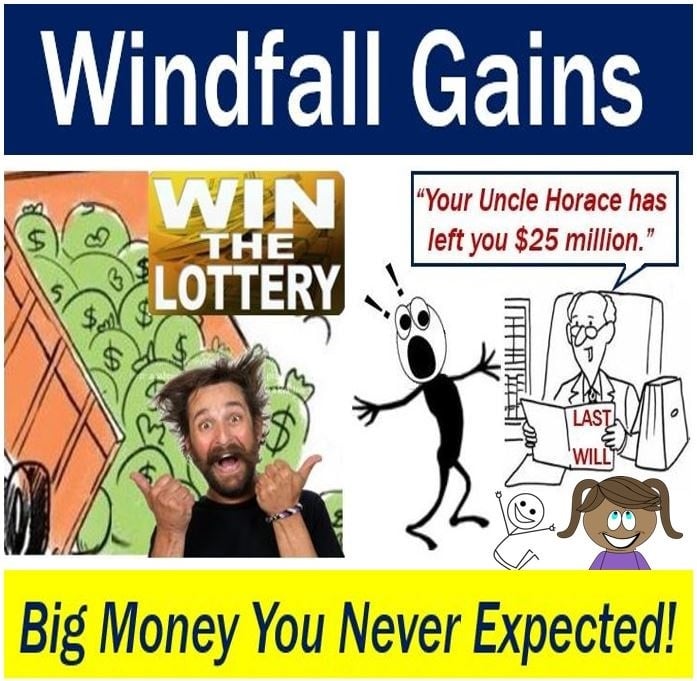Windfall gains are unexpected large amounts of money that people receive or win. If you win a large amount of money at bingo, an afternoon’s betting at the races, or on the lottery, those winnings are windfall gains. Other examples of windfall gains include finding a rare coin and selling it for a lot of money, or selling an antique that you had discovered when you were cleaning your attic for a small fortune.
An unexpected inheritance could also be described as a windfall gain. If the selling of a real estate property coincides with a significant rise in property prices, which means that you make a considerable profit, that is a windfall gain.
Windfall profit is part of the overall meaning of windfall gain, but refers specifically to events where a profit is made. So, the money made in the real estate example above could also be described as a windfall profit, but receiving an unexpected inheritance is only a windfall gain – you did not buy the inheritance and then sell it at a huge profit.
 If you receive money unexpectedly, and you had no control over the event, it is a windfall gain.
If you receive money unexpectedly, and you had no control over the event, it is a windfall gain.
In all the cases, the recipient has absolutely no expectation or control over the event.
According to The Economist’s glossary of terms, windfall gains are:
“Income you do not expect, such as winning a lottery prize. Economists have long argued about whether people are likely to save such windfalls or spend them.”
“According to the Permanent Income Hypothesis, favored by most economists, people save the lion’s share of windfall gains. But real life often contradicts this; ask any lottery winner.”
Do we save or spend windfall gains?
Many studies have been carried out on what human beings do when they suddenly come into or win a lot of money. Do we go nuts and spend it all, do we save half and spend the other half, or are we ultra-cautious creatures who put most of it away somewhere safe?
The majority of economists tend to agree that most our windfall gains – more than 50% – are saved. However, there are many studies suggesting that we are big spenders.
Windfall profit tax is levied by some governments against certain industries when economic conditions go their way and they make above-average profits.
A study carried out by researchers from Stonehill College, Ohio University, and the University of Michigan – The Psychology of Windfall Gains – and published in the journal Organiational Behavior and Human Decision Processes in 1994, informed that the majority of participants who completed three questionnaires said they more readily spent windfall gains than other types of assets.
The researchers carried two studies, using actual money, to determine whether what people had claimed would really happen in practice.
One group of participants was told one to five days before the experiment that they would receive money for taking part in the experiments. The other group was not told until the experiment began.
In the first cash study, those who anticipated payment bet significantly less during a gambling game than the participants who were given no forewarning. In the second cash study, the participants who had not known they were going to be paid spent more money at a basketball game that those who knew they would receive money.
If what happened in this study applies to all humans, it means that when we unexpectedly come into some money, we tend to spend more and take bigger financial risks. The participants who had not expected to receive money before the experiments began were the ones who gambled and spent more.
The results of the study do not suggest that we spend all our windfall money, but rather that we become less cautious after we unexpectedly receive money.
Behaviors after windfall gains
– Blew it All: Evelyn Adams, from New Jersey, USA, won a grand total of $5.4 million in the lottery. She went to Atlantic City and immersed herself in a mega-gambling spree. Unfortunately, she lost all her winnings and today lives in a trailer park, according to AskMen.com.
Water Park: in 2011, John Kutey cashed in a $319 million Mega Million jackpot for a share of $28.7 million. He and his wife donated some of their winnings towards the construction of a water park, says The Albany Time Union, in honor of their parents.
Trust Named After Dessert: in 2012, 81-year-old Louise White, from Newport, Rhode Island, USA, purchased a lottery ticket that won her $336.4 million. Just before buying the ticket, she had bought a rainbow sherbert at the shop. She created The Rainbow Sherbert Trust in honor of her lucky dessert, says ABC News.
British Winners: according to a study by Camelot (which runs the UK’s National Lottery) and Oxford Economics, more than £8.5 billion has been won since 1994, when the National Lottery began. Property was by far the most popular item that winners spent their money on – a total of £2.72 billion. This was followed by investments for their own or children’s future, and then gifts to family and friends.
Fifty-nine percent of British lottery winners gave up work, fifteen percent started their own business, and thirty-one percent undertook voluntary work.
Video – What is a windfall profit?
This Investor Trading Academy video explains what a windfall profit is, and why politicians argue that such windfall gains should be taxed. The big problems comes, the speaker explains, when lawmakers begin claiming that companies’ profits, which were deserved and expected, are windfalls.
